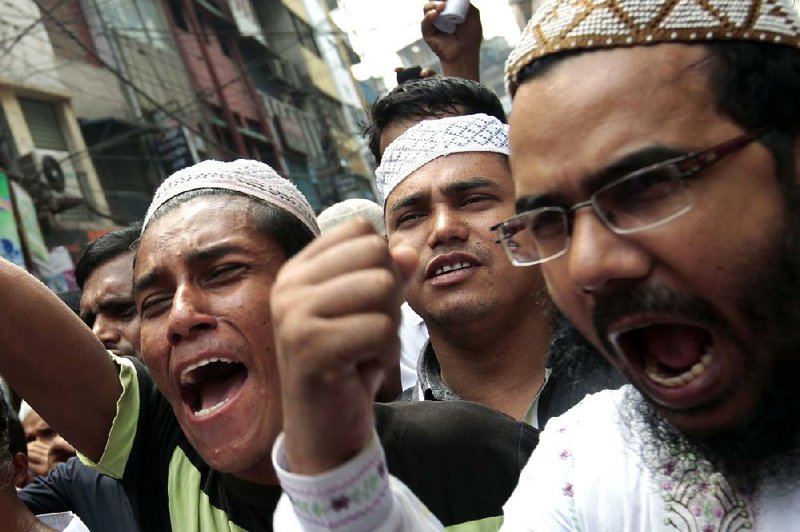ISLAMABAD — The Pakistani Taliban announced Wednesday that they were giving a Cabinet minister an “amnesty,” taking him off their hit list, because he offered a $100,000 bounty for the killing of an anti-Islam filmmaker.
Separately, a breakaway faction of the Afghan Taliban announced its own bounty for those behind Innocence of Muslims, the film that has sparked deadly protests across the Islamic world. The group is offering almost $500,000 in gold.
Muslims have been angered by the crude, amateurish film’s portrayal of the Prophet Muhammad as a fraud, a womanizer and a child molester. Dozens of people have died in violence linked to protests over the movie.
The main figure behind the video, Nakoula Basseley Nakoula, has put his U.S. home up for sale and gone into hiding since violence broke out over the 14-minute YouTube trailer for Innocence of Muslims, which also has sparked debate over freedom of expression in the U.S. and in Europe.
Some of the most intense protests have been in Pakistan, where the role of Islam in society is sacrosanct and anti-American sentiment runs high. It was in that atmosphere that Railways Minister Ghulam Ahmad Bilour offered his $100,000 reward Saturday for anyone who kills Nakoula.
Bilour also appealed to al-Qaida and Taliban militants to help eliminate the filmmaker, while Pakistan’s government said the bounty reflected Bilour’s personal view and was not official policy.
The minister belongs to the secular Awami National Party, an ally in the government of President Asif Ali Zardari. His comments drew criticism within his own party, which is considered anti-Taliban and has lost several leaders in the fight against the insurgency.
Pakistani Taliban spokesman Ahsanullah Ahsan said Wednesday that the minister’s views represent the true spirit of Islam, and that, consequently, the insurgents have removed him from their hit list.
But while Bilour gets an “amnesty,” others in his party are still fair game, Ahsan said. Bilour could not immediately be reached for comment.
In Afghanistan, the Taliban faction known as the Dadullah Group offered more than 17 pounds of gold to anyone who kills the film’s creators. Spokesman Rehbar Mal, announced the reward, which would be the equivalent of about $487,000.
The group, named for a Taliban commander killed by NATO troops in 2007, broke away from the Afghan Taliban earlier this year to protest reconciliation talks with the United States. The Afghan Taliban and the Pakistani Taliban are separate, though linked, militant outfits.
Meanwhile, a judge in Brazil ordered YouTube to remove clips of the film late Tuesday, and a Turkish court issued an order Wednesday allowing authorities in the country to block Internet access to it.
Judge Gilson Delgado Miranda gave YouTube 10 days to remove the videos. After that, YouTube’s parent company, Google, will face fines of $5,000 a day for every day the clips remain accessible in Brazil, according to the statement posted on the court’s website late Tuesday.
The lawsuit was filed by a group representing Brazil’s Muslim community, the National Union of Islamic Entities, which claims the film violates Brazil’s constitutional guarantee of religious freedom for all faiths.
In a statement on the group’s website, Mohamad al Bukai, the head of religious matters for the Sao Paulobased organization, hailed the ruling as a victory.
“Freedom of expression must not be confused with giving disproportionate and irresponsible offense, which can provoke serious consequences for society,” al Bukai said.
The statement also includes excerpts from the ruling, in which the judge stresses “this type of jurisprudence cannot be confused with censorship,” which he defines as “the undue restriction of the civic consciousness.”
Courts or officials in other countries also have sought to restrict access to clips of Innocence of Muslims, renewing the debate over freedom of expression in the Middle East, the United States and Europe.
Binali Yildirim, the Turkish minister in charge of transportation and communications, told state-run TRT television Wednesday that the injunction allows government telecommunications and information technology authorities to prevent access from Turkey to URL links to the film.
The move came a day after another government minister said Prime Minister Recep Tayyip Erdogan, who heads an Islam-based party, ordered officials to find ways of preventing access to videos of the film.
“To insult what is sacred, to incite indignation is unacceptable for all religions. It is a hate crime and no crime should go unpunished,” Yildirim said. His office said Tuesday that the ministry also asked Google Inc. and YouTube to remove the videos.
Erdogan has criticized Western nations for not taking steps to prevent insults to Islamic values but also has criticized violent protests against the film, saying they harm Islam.
Yildirim said the court order is limited to links to the film and that access to websites that carry the links would not be blocked. Turkey banned access to YouTube from 2008 and 2010 because of videos deemed insulting to the country’s founder, Mustafa Kemal Ataturk.
Information for this article was contributed by Asif Shahzad, Jenny Barchfield, Kathy Gannon and staff members of The Associated Press.
Front Section, Pages 2 on 09/27/2012

